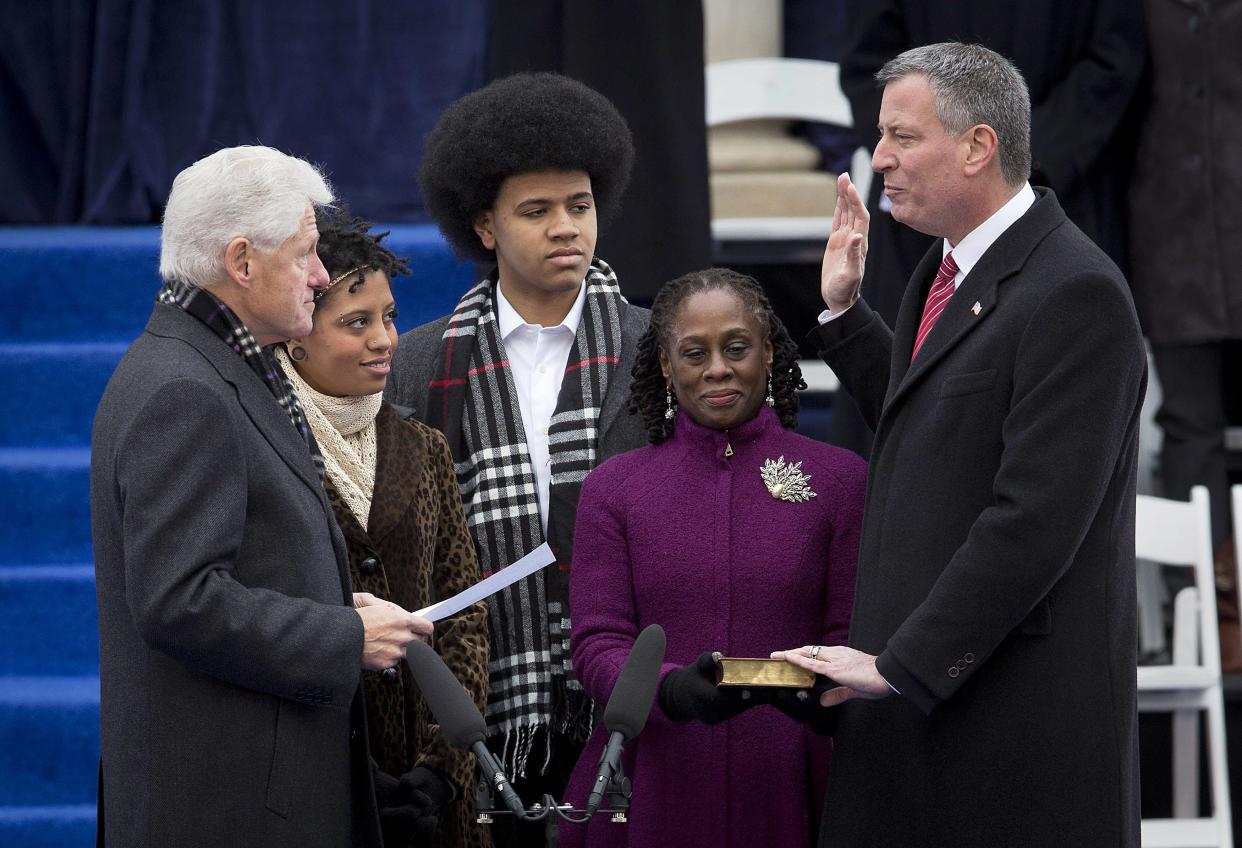Bill de Blasio sworn in as NYC mayor

NEW YORK — Bill de Blasio was formally sworn in as the 109th mayor of New York City on Wednesday, becoming the first Democrat in two decades to lead City Hall and ushering in what is expected to be an era of liberal progressive governance in the nation’s largest city.
De Blasio, a former City Council member who most recently served as the city’s public advocate, formally assumed control of the city during a star-studded inauguration ceremony held on the chilly steps of City Hall in Lower Manhattan, where he doubled down on his campaign pledge to fight economic inequality in the city. He likened it in importance to other problems the city has faced, including the aftermath of the Sept. 11, 2001, terrorist attacks and Superstorm Sandy.
"Our city is no stranger to big struggles — and no stranger to overcoming them,” de Blasio declared. “New York has faced fiscal collapse, a crime epidemic, terrorist attacks, and natural disasters. But now, in our time, we face a different crisis — an inequality crisis. It’s not often the stuff of banner headlines in our daily newspapers. It’s a quiet crisis, but one no less pernicious than those that have come before.”
On that issue and other campaign pledges, de Blasio signaled an aggressive agenda in the coming months, telling his audience, "We won't wait. We will do it now."
Former President Bill Clinton administered the oath of office to de Blasio before an audience that included much of the city’s political elite, including former Secretary of State Hillary Clinton and Gov. Andrew Cuomo. The event followed a more modest ceremony held outside de Blasio’s home in Park Slope, Brooklyn, shortly after midnight, when he was officially sworn in to succeed Michael Bloomberg as mayor.
The inauguration marked a stratospheric rise for de Blasio, a veteran political strategist whose bid for mayor seemed long shot at best as recently as six months ago, when he trailed in a distant fourth place in the Democratic mayoral primary.
But de Blasio’s fortunes changed as he positioned himself as the progressive antithesis to Bloomberg — vowing to enact policies to help poor and middle-class New Yorkers that he argued had been "left behind” by Bloomberg. He said Bloomberg’s policies had turned New York into a “tale of two cities: one for the rich and one for the poor” and pledged to do more to battle income inequality — in part by raising taxes on the rich to fund universal pre-kindergarten programs in the city.
But delivering on that proposal is sure to be an early test for de Blasio, whose administration is being viewed by progressive activists around the country as a test for how far liberal policies can go in a major city. Already, Cuomo and other state officials who must sign off on any new tax increases have been openly skeptical of de Blasio’s pre-kindergarten plan, suggesting a tax hike could drive wealthy residents out of New York City.
In his inauguration speech, de Blasio acknowledged the challenges ahead but insisted his campaign wasn't based just on "political talk in the interest of getting elected." He said solving the inequality crisis was crucial to the future of New York City.
"Its urgency is read on the faces of our neighbors and their children, as families struggle to make it against increasingly long odds," de Blasio said. "To tackle a challenge this daunting, we need a dramatic new approach — rebuilding our communities from the bottom up, from the neighborhoods up. And just like before, the world will watch as we succeed."
"All along the way, we will remember what makes New York, New York," he added. "A city that fights injustice and inequality — not just because it honors our values, but because it strengthens our people. A city of five boroughs — all created equal.... A city that remembers our responsibility to each other — our common cause — is to leave no New Yorker behind."
Another key test will be de Blasio’s handling of the New York City Police Department. As a candidate, he made rolling back the “stop and frisk" police tactic — a controversial practice directed overwhelmingly at black and Hispanic men — a centerpiece of his campaign. He used his own family — he is married to a black woman and has two multiracial kids — to illustrate his understanding of the racial tensions between residents and the NYPD.
He and his new police chief, William Bratton, have said they will moderate the use of “stop and frisk” and improve the relationship between the NYPD and city residents while at the same time maintaining New York’s historically low crime rates.
At the same time, de Blasio faces a litany of other challenges, including the negotiation of 150 city labor contracts that affect some 300,000 municipal employees who have been working without contracts for five years.
But de Blasio, who defeated his Republican opponent Joe Lhota by nearly 50 points in November, has moved to seize advantage of his historic margin of victory and the popularity of what he has long referred to as his "modern family," who played a major role in his campaign and look to remain center stage during his tenure at City Hall.
On Wednesday, de Blasio was joined onstage by his wife, Chirlane McCray, and their two children, Dante, 16, and Chiara, 19. Before administering the oath, Clinton spoke glowingly of de Blasio, who served as a regional director for the Department of Housing and Urban Development during his administration. The former president praised de Blasio's efforts to combat inequality — but also praised him as a face of the political future.
"He represents, with his family, the future of our city and the future of our country," Clinton said.



